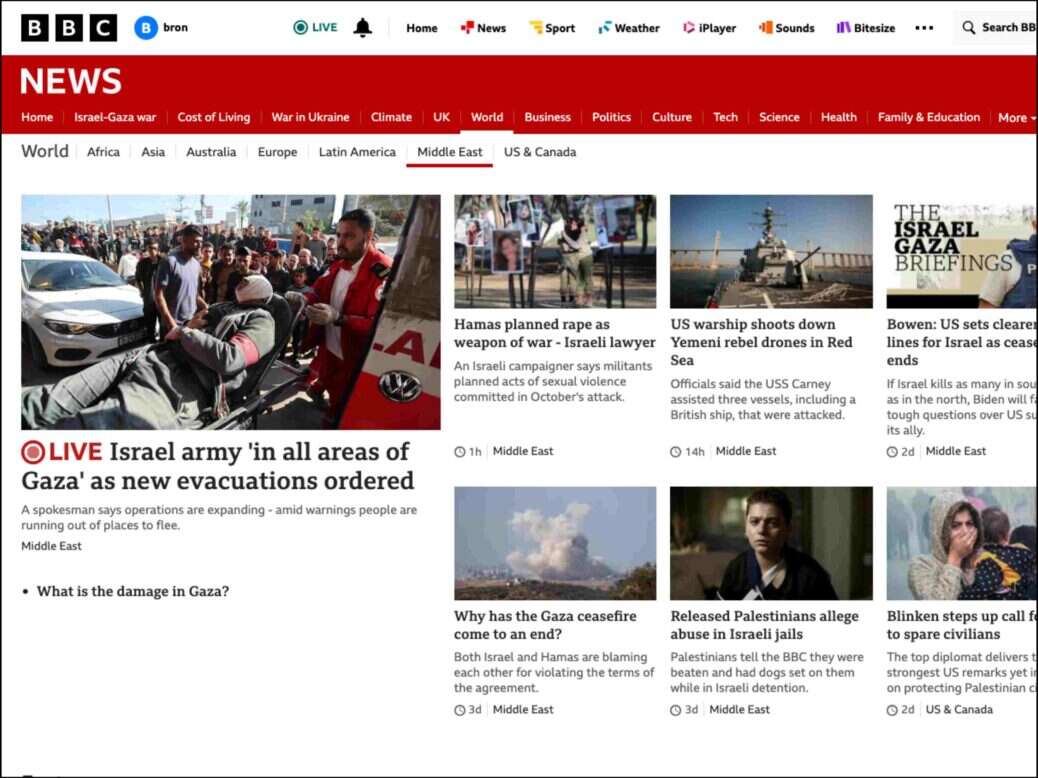
A poll conducted by think tank More in Common has found roughly equal numbers of people find the BBC’s coverage to be pro-Israel as think it is pro-Palestine.
However, even more of the 2,000 people polled said they felt the public broadcaster’s output on the conflict between Israel and Hamas had been mostly neutral.
In its report “More than choosing sides: How Britons are navigating the Israel-Palestine conflict”, More in Common surveyed British adults on how neutral or biased five leading UK publishers had been in their coverage of the 2023 Gaza-Israel .
Of the five, BBC News had the most respondents (36%) saying it covered the conflict neutrally – but also the second most people saying both that it had been biased in favour of Palestine (15%) and in favour of Israel (17%).
Authors Ed Hodgson and Luke Tryl said in the report that the BBC “gets a more equal distribution of responses here than any other media source we tested and people are more likely to say that it takes a neutral outlook than any other news source we tested”.
Daily Mail was seen as the most pro-Israel news organisation, with 20% of those surveyed saying it was biased in favour of the country. Another 20% of people said the newspaper had been mostly neutral, however. A further 5% said it was mostly biased in favour of Palestine, and a majority (55%) did not know.
Qatar-based Al Jazeera was seen as the most pro-Palestine of the five outlets, with 18% of survey respondents saying its coverage had been mostly biased in favour of Palestinians. Some 6% felt it was pro-Israel and 14% mostly neutral, making it the only publisher thought to be biased in a particular direction by more people than thought it was neutral. However, 62% of those polled did not know Al Jazeera’s stance, the highest proportion for any of the five.
ITV News was seen as neutral by 35% of respondents, the second highest proportion after the BBC. Some 13% thought the commercial broadcaster had been mostly biased in favour of Israel and 7% in favour of Palestine.
Like the BBC, The Guardian was described as biased by almost as many people as thought it had been neutral: 9% felt it supported Palestine, 11% Israel, and 21% neither.
The survey was carried out between 3 and 6 November, two weeks after The Guardian reported that, among 1,500 complaints the BBC had received over its coverage of the Israel-Hamas conflict, as many accused the corporation of bias against Israel as against Palestine.
People most likely to think BBC biased on Israel and Palestine in the opposite direction from their views
The people polled by More in Common were much more likely to say the BBC was biased in favour of Palestinians if they themselves sympathised more with Israel. Similarly, those who sympathised more with Palestine were much more likely to say the BBC was biased in favour of the Israeli government.
Among those who sympathised more with the Israeli side, 45% said the BBC had been biased in favour of the Palestinian side, versus 30% who said it had been neutral. Some 38% of those sympathising with Palestine thought the BBC was biased in favour of Israel, versus 32% who felt it had been neutral.
Half of the respondents who said they sympathised with both sides equally said the BBC had been mostly neutral. Some 40% of those sympathising with neither agreed.
The authors said that, “in place of the BBC, many of those with the strongest views on the conflict have switched to social media (and particularly Instagram) as their source of information about the war…
“There is a risk that low trust in the BBC from those with strongly held pre-existing views on the conflict means the most opinionated Britons end up with no shared facts to inform their debates about the conflict.”
Since the 7 October Hamas attack on southern Israel and throughout the subsequent Israeli bombing campaign in Gaza the BBC’s coverage of the conflict has come in for close scrutiny.
The corporation’s claim that it does not describe militant groups like Hamas as terrorists was called “shameful” by Defence Secretary Grant Shapps in October, days after its London headquarters were splattered with red paint by Palestine Action for “manufacturing consent for Israel’s war crimes”.
Subsequently BBC News deputy chief executive Jonathan Munro said that the corporation made a “mistake” when correspondent Jon Donnison speculated that an explosion at Gaza’s Al Ahli Hospital was caused by an Israeli missile. The BBC’s executive complaints unit did not uphold complaints about the incident, in part because a clarification was published to its website two days later.
[Read more: Israel-Hamas war - More than 50 journalists killed in conflict so far]
Email pged@pressgazette.co.uk to point out mistakes, provide story tips or send in a letter for publication on our "Letters Page" blog
